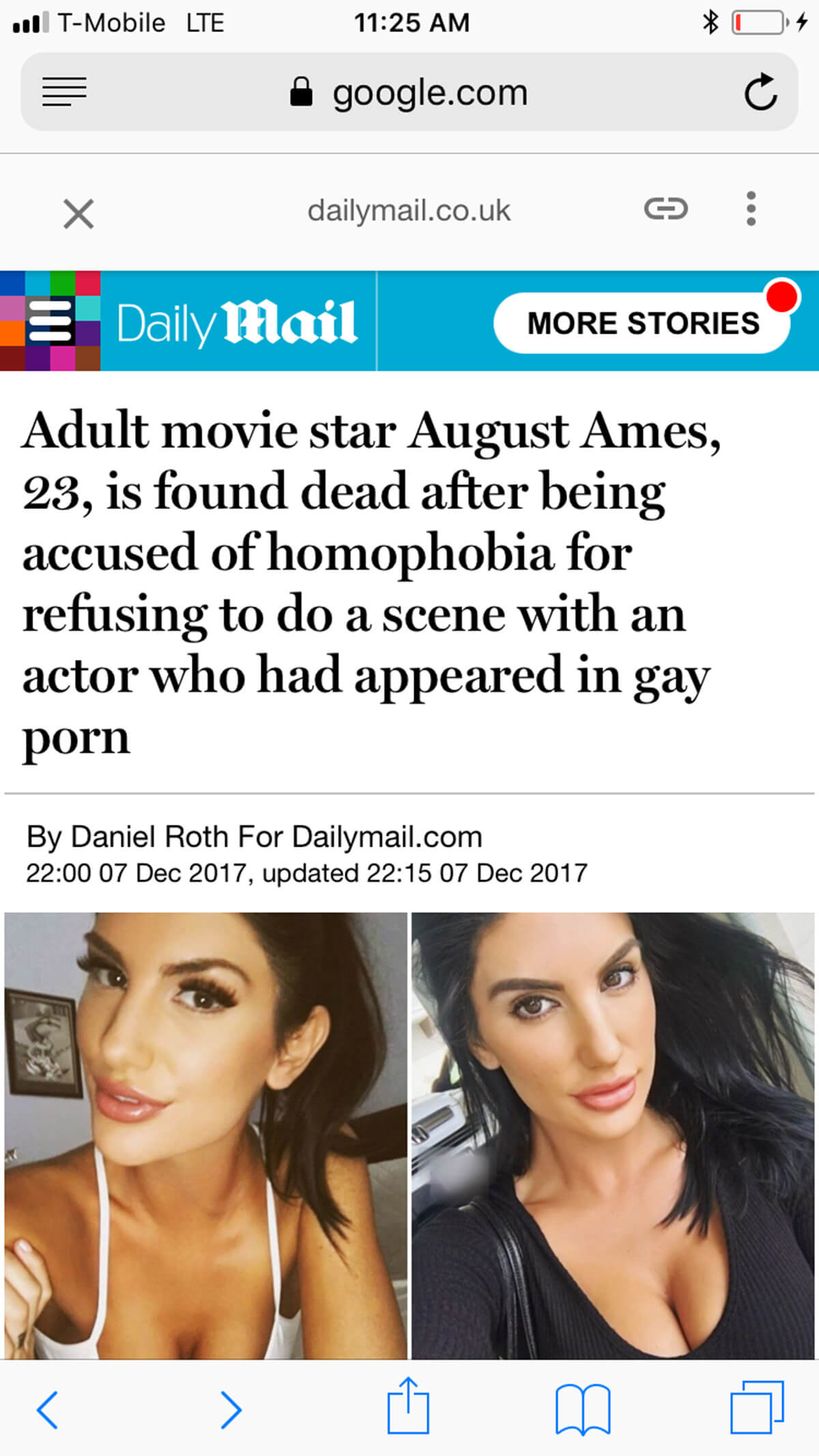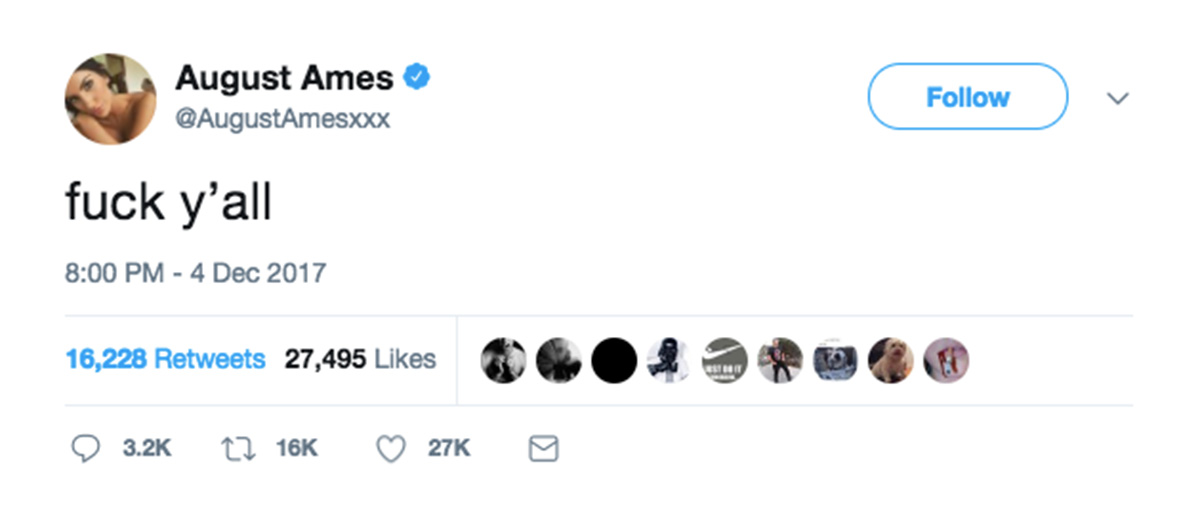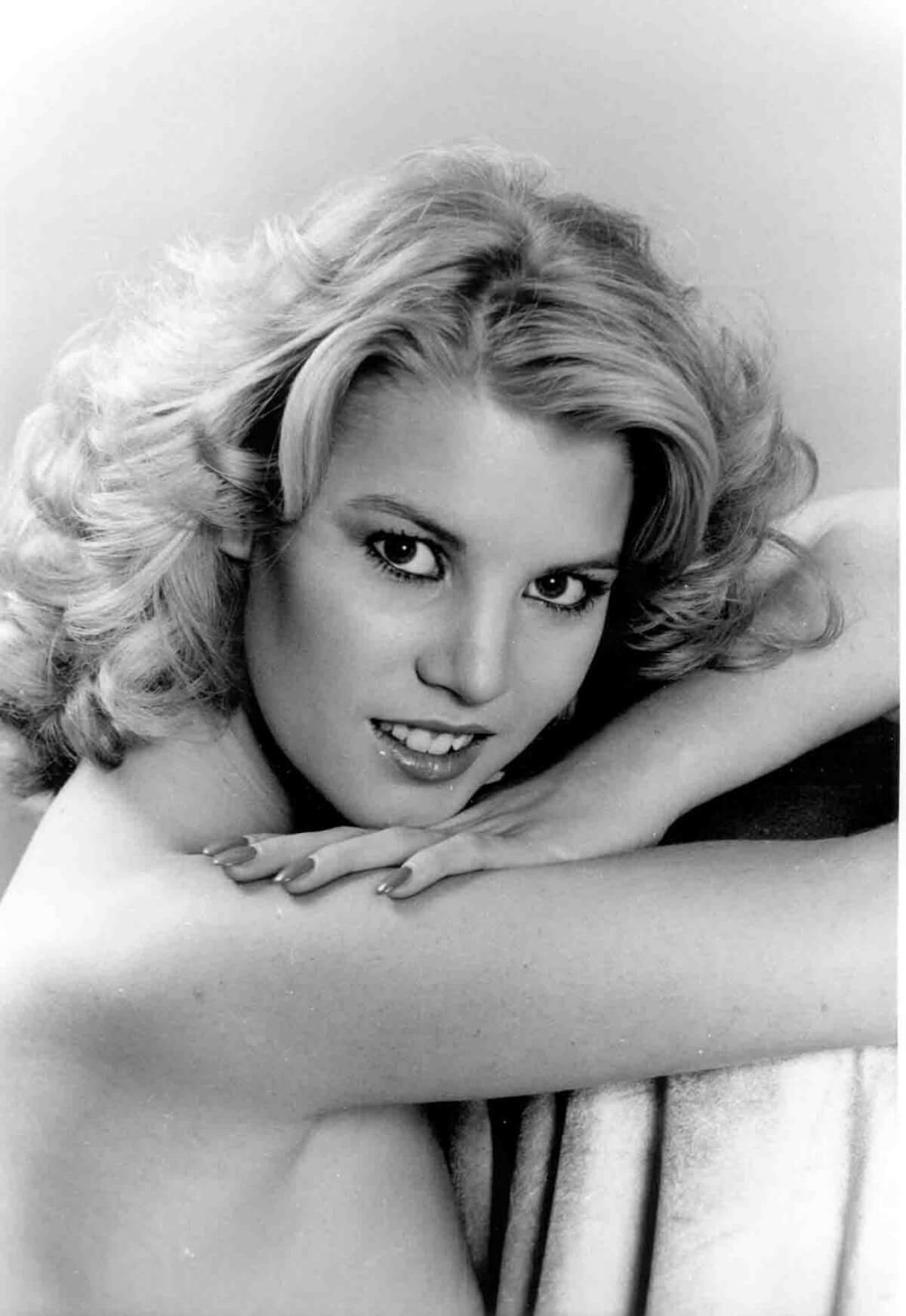August Ames
Alissa Bennett
January 1, 2018

Porn suicides stir the heart’s obsessive embers. It’s not that the details of these deaths are any more lurid (the abandoned body of a hanged adult actress is no different from that of an overdosed teen idol), but the depressingly familiar narrative running through many sad endings in pornography speaks to me acutely.
It’s inappropriate to postulate if the instances of drug use and childhood abandonment that often come to light in the wake of these deaths are incidental—it is prurient to suggest that adults who choose to engage in sex work are impelled to do so because of the host of issues that can follow at the heels of abuse—but I will say that pornography proves again and again to be a treacherous path for emotionally fragile people.
August Ames’ suicide on December 5th was recounted by mainstream media outlets with unusual voracity. While a porn star’s death typically generates a few days of articles on low-rent news sites replete with predictably cruel reader comments about the fluctuating value of human life, Ames’ opened up a more complicated set of concerns—not only about pornography, but about the ferocity with which we consume strangers from a distance. While this is certainly a story about a depressive 23-year-old woman whose projected jouissance did not have a prayer of matching up to the reality of her life, it is also a story about all of us.
I first read about Ames’ death in a breathless Daily Mail article posted on the morning of December 7th. Under a headline that read “Adult movie star August Ames, 23, is found dead after being accused of homophobia for refusing to do a scene with an actor who had appeared in gay porn,” I learned that Ames had been involved in a chain of negative Twitter interactions that many claimed had catalyzed her decision to take her life. Ames’ death had not yet become widely known, and her Twitter account continued to bare a steady stream of comments that alternately excoriated and defended her, the majority of which appeared under a tweet that read:

“Whichever (lady) performer is replacing me tomorrow for @EroticaXNews, you’re shooting with a guy who has shot gay porn, just to let cha know. BS is all I can say. Do agents really not care about who they’re representing? #ladirect I do my homework for my body.”
The implication, of course, is that male actors who participate in gay pornography are at higher risk for HIV infection, a sentiment that many read as the perpetuation of a myth that frames the gay body as a metonym of disease. Accusations of homophobia were immediate and Ames worked to defend herself by decrying the suggestion as baseless; for two days she denied that her statement was rooted in anything other than a duty to herself to make decisions that served her health. In a final tweet on December 4th she wrote, quite simply, “Fuck y’all.”
In sorting through the particulars of the story, it seemed clear to me that Ames, even if her rationale was rooted in an outdated understanding of the respective STI-testing protocols in gay and straight porn, was primarily trying to demonstrate her agency as a worker in an industry that often goes to great lengths to conceal gestures of personal choice.
We expect adult actors to engage in the things that we ourselves want to see and we don’t care if their performances are sometimes nothing more than louche pantomimes; we need only believe what we are watching for as long as it takes to get off. When asked in a recent interview about communication with her fans, Ames said that she most frequently received requests. “They ask things like when are you going to do anal? When is your next gang bang? I’d love to see you do a huge blow bang with ten huge dicks cumming all over your face.”

She followed up with an account of being anally raped as a teenager; a dog whistle, perhaps, to those who wished she would get over her personal trauma and do her job. In another interview that took place at an adult industry convention in Chicago, a reporter closes his questioning by asking her to turn around—he slaps her ass without asking, the camera zooms in, and the screen goes dark. I recount these anecdotes primarily because they serve as a useful means for us to imagine what it must feel like to say “no” when your job is to say “yes,” what it must feel like to be a sex-positive woman whose professional life often entails protecting very personal boundaries.
Ames’ death suggests how our increasing reliance on digital communication as a mechanism to police political morality imperils us all: it wreaks havoc on the possibilities of rational discourse and compromise, and it is particularly dangerous because it is so easy. There is pleasure to be found in typing out the words “shut up.” It can be thrilling to call a racist stranger exactly what she is, to make sure that a woman hater knows you have seen him. Ames’ original statement may be read by some as a dangerous reiteration of caustic misinformation, but she was also 23 and the recipient of heirloomed information presented as fact.
Reading through the two days of comments that followed her initial post, I can imagine that she felt assaulted and misunderstood. I can imagine that she felt worthless and stupid and embarrassed. The question that lingers after her death is whether or not an emotionally healthy person could experience enough stress from an event like this to end her life. Many leapt to the conclusion that the internet was August Ames’ undertaker; I would venture that it was not, though it certainly did not help.
This past September, Ames participated in a since-deleted podcast with photographer Holly Randall that offered all of us an unexpectedly confessional chronology of her transformation from the small-town Canadian girl Mercedes Grabowski to the porn star August Ames. In response to a relatively benign question about mental health, Ames states that her depression is often so profound that she is bedridden for weeks.
She tells us that her life changed forever when she confessed to her father that a family member had molested her and her charges were dismissed as vindictive fiction. She tells us that her mother’s own depression and emotional volatility made her impossible to live with. She tells us that she was sent away to live in a group home when she was 12 and that she has struggled her entire life with feelings of worthlessness and humiliation, that these only abated when she moved to California at age 19 to begin her career in pornography.

In every adult-industry suicide that I have ever read about, there is an immeasurable and often insurmountable distance between the Mercedes and the Augusts—between the injured person and the ahistorical persona, both of whom are charged with the complex task of inhabiting one body. It was strange in the Randall interview to hear Ames claim that she suffered from dissociative identity disorder, a controversial diagnosis characterized by a fragmented identity featuring at least two distinct personalities.
I spent a moment wondering if it was true before deciding that it didn’t matter. It was believable, regardless of whether a doctor or Ames herself had identified it. Aggressive commenters on Twitter did not kill Mercedes Grabowski, but they did accidentally make the division between her and August Ames painfully transparent. They reminded her that no matter how carefully we construct our own reinventions, it is almost impossible to run away from yourself.
I tried my best to understand the schism between August the performer and Mercedes the person; perhaps my queries were too close to her death, because I was largely unsuccessful. Though many of my messages went unread or unanswered, I did hear back from Holly Randall, who expressed that she was too traumatized to speak with me. I also contacted several of Ames’ defenders on Twitter, but in the end, I only heard back from one: she told me to fuck myself and blamed me for the Trump presidency.
Gay adult actor and activist Conner Habib graciously agreed to have a phone call with me to discuss the often prickly hedge between straight and gay pornography. He described the social implications of Ames’ tweet and explained the importance of liberating gay sex from a swamp of dangerous and outdated mythologies. He expressed sadness regarding the series of events that led a 23-year-old woman to decide that hanging herself in a public park was the solution to end an online scuffle bristling with cruelty—an end that showed how communication and access to mental health care are crucial. These assertions are hard to disagree with.
I have spent many hours ransacking the internet for information on adult stars who enter and exit the public sphere with such rapidity that they are often erased before I notice them. Again and again I am struck by the space between the person and the performance, startled by how easy we find it to pass judgment on strangers for the express purpose of feeling the momentary power that doing so entails.
I remember coming across a 2008 post on the now-defunct website The Bastardly about adult actress Haley Paige. It featured a topless photograph of her signing calendars at a fan event and would have been rather unremarkable if not for the events that followed.

At some point, people in the comments section began remarking on Paige’s breasts, discussing how badly she needed cosmetic surgery, how awful she looked, how hard it is to fantasize about a porn star whose body resists the parameters of contemporary fantasy. The conversation continued for some days until Paige herself made an appearance.
“Most of you who wrote such odious comments about my breasts should find a real past time and get a fucking life,” she wrote. “As it is, obviously my self confidence is not good to say the least, thank you for ruining my week you feeble assholes. Yes, my breasts sag, do you think I don’t know that? I look at my self in the mirror everyday and hate them but refuse to get a breast job. So you will be happy to know that I have basically quit performing and am focusing on my studies. As for the suicide comment, it does cross my mind.”
Some months later, Paige’s father entered the discussion to inform readers that Paige had died of a methadone overdose. Her real name was Maryam Haley. She was 25 years old.
It would be facile to connect adult-industry suicides and overdoses with the stress performers feel from having to reconcile their public personas with their private lives, and it’s reductive to suggest that our consumption of pornography often results in the consumption of people. Damage is not a predetermining factor for sex workers; the few studies that have examined the mental health of adult performers have found no correlation between abuse and the choice to work in pornography.
The story of August Ames does remind us, however, that most of us do our best to conceal our vulnerabilities, that there is a fracture between how we feel and how we want to be seen. Ames’ death lays bare the difference between persona and personhood, it reminds us that typing insults at a stranger rarely results in being heard. I would suggest that we’d all be better off remembering that.